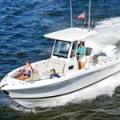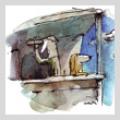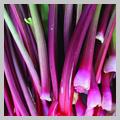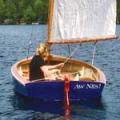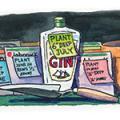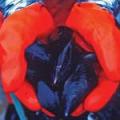Awanadjo Almanack - Issue 113
is having time to think.
By Rob McCall
That time of year thou mayst in me behold
When yellow leaves, or none, or few, do hang
Upon those boughs which shake against the cold,
Bare ruined choirs, where late
the sweet birds sang.
Dear Friends: One of the things I love about winter is having time to think. We have two rope-seated, spindle-legged, straight-back chairs—one red, one blue—on either side of the 1905 Glenwood stove in the kitchen. There’s nothing like an hour, or even two, spent there. You know how they say the older you get the faster time goes? Maybe age has nothing to do with it. Time is a function of motion: if there were no motion there would be no time.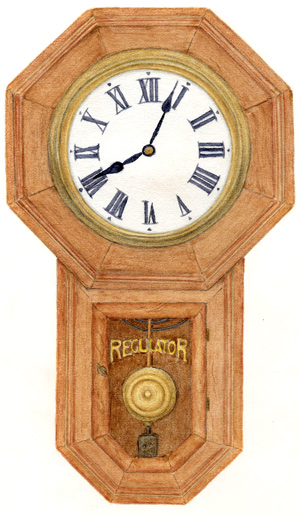 Illustration by Candace HutchinsonLike so much around us, the velocity of our lives increases year by year. I used to have a 1960 Dodge D-100 panel truck that had a cruising speed of about 45. The windshield wipers had only one speed, so if you went over 45, the wipers couldn’t stay ahead of the rain. That was only 50 years ago. Fifty years before that the Model T had a top speed of about the same. Today these couldn’t legally be driven on Interstate highways. They’d be a slow-moving hazard.
The great medieval cathedrals of Europe each took a century or more to construct. The Dubai Tower took five years to build; the Empire State building, only one. Olympic speed-skating is shown on prime-time while curling is shown in the wee hours. We have clocks on our wrists, our cell phones, our computers, and our appliances; clocks in every room. And yet we never seem to have enough time; we’re always in a hurry. Meanwhile, stress is killing us. Doctors are busy treating stress-related diseases of the body. Therapists and clergy are busy treating stress-related diseases of the mind and soul. To relax, we rush off to the airport to fly at 400 miles per hour to hectic vacation spots, and then we rush back exhausted. We have no time for timelessness.
Meanwhile, the seasons still change at the same slow pace they have always kept. The sun still rises and sets no faster than ever. The planets ponderously move as they always did. And the length of our lives is still three-score and ten or four-score years, as it was when the Psalms were set down three thousand years ago. So what’s the big hurry?
That’s why it’s so blissful to lose all track of time in simply daydreaming or reading or just sitting by the stove thinking on a blustery night. No stress, no pressure, no hurry. I like to take my own sweet time, and won’t easily let someone else take it from me. That is why you may see me driving through town at five miles under the speed limit instead of ten over. Maybe I can add a couple of minutes to the precious life of that impatient driver on my tail.
Rank opinion
We evolved at walking speed—about four miles an hour. Do you want to live longer? Slow down. Do you want your children to live longer? Slow them down. Let them get bored now and then. Let them see you do nothing for a while. Walk and talk. Sit and think. Squeeze all the juice out of every moment. Make some space in your schedule for eternity. You may live longer or you may not, but guaranteed, you’ll live better.
Seedpod to carry around with you
From Annie Dillard: “How we spend our days is, of course, how we spend our lives.”
Natural events, early February
Sometimes the January thaw comes in early February, with heavy rain and a few days of warm weather that draws down the thick snow cover. Day dawns clear after the rain and a cardinal sings in the top of a black locust tree all morning, while blackbirds chant in the high trees, raising unfounded hopes for an early spring. Then winter comes back.
Illustration by Candace HutchinsonLike so much around us, the velocity of our lives increases year by year. I used to have a 1960 Dodge D-100 panel truck that had a cruising speed of about 45. The windshield wipers had only one speed, so if you went over 45, the wipers couldn’t stay ahead of the rain. That was only 50 years ago. Fifty years before that the Model T had a top speed of about the same. Today these couldn’t legally be driven on Interstate highways. They’d be a slow-moving hazard.
The great medieval cathedrals of Europe each took a century or more to construct. The Dubai Tower took five years to build; the Empire State building, only one. Olympic speed-skating is shown on prime-time while curling is shown in the wee hours. We have clocks on our wrists, our cell phones, our computers, and our appliances; clocks in every room. And yet we never seem to have enough time; we’re always in a hurry. Meanwhile, stress is killing us. Doctors are busy treating stress-related diseases of the body. Therapists and clergy are busy treating stress-related diseases of the mind and soul. To relax, we rush off to the airport to fly at 400 miles per hour to hectic vacation spots, and then we rush back exhausted. We have no time for timelessness.
Meanwhile, the seasons still change at the same slow pace they have always kept. The sun still rises and sets no faster than ever. The planets ponderously move as they always did. And the length of our lives is still three-score and ten or four-score years, as it was when the Psalms were set down three thousand years ago. So what’s the big hurry?
That’s why it’s so blissful to lose all track of time in simply daydreaming or reading or just sitting by the stove thinking on a blustery night. No stress, no pressure, no hurry. I like to take my own sweet time, and won’t easily let someone else take it from me. That is why you may see me driving through town at five miles under the speed limit instead of ten over. Maybe I can add a couple of minutes to the precious life of that impatient driver on my tail.
Rank opinion
We evolved at walking speed—about four miles an hour. Do you want to live longer? Slow down. Do you want your children to live longer? Slow them down. Let them get bored now and then. Let them see you do nothing for a while. Walk and talk. Sit and think. Squeeze all the juice out of every moment. Make some space in your schedule for eternity. You may live longer or you may not, but guaranteed, you’ll live better.
Seedpod to carry around with you
From Annie Dillard: “How we spend our days is, of course, how we spend our lives.”
Natural events, early February
Sometimes the January thaw comes in early February, with heavy rain and a few days of warm weather that draws down the thick snow cover. Day dawns clear after the rain and a cardinal sings in the top of a black locust tree all morning, while blackbirds chant in the high trees, raising unfounded hopes for an early spring. Then winter comes back.
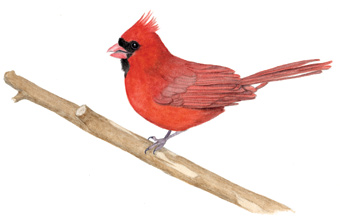 Illustration by Candace HutchinsonSaltwater report, early February
Another fishing boat went down in Cobscook Bay last year about this time, once again among the treacherous rocks and currents near the reversing falls. We wonder whether this is because [a] there are more scallops in that area, or [b] the waters are more dangerous there, or [c] fishermen are more desperate these days, or [d] all of the above. Fortunately, no lives were lost, but unfortunately, hundreds of gallons of diesel fuel went overboard to further pollute the waters of this beautiful bay, home to seals, sea ducks, porpoises, whales, and sea creatures innumerable.
Rank opinion
If this had happened on land, clean-up crews would be right on hand to contain the spill, and someone would be held accountable. But, we still expect the seas to passively absorb all our sewage, garbage, wreckage, and foul discharges with no consequences to us. We have yet to take seriously the inescapable fact that the sea is still the source of all water, and so, of all life on earth. What we do to the seas, we do to ourselves.
Natural events, late February
One of the temptations of our frail souls at this season is to start counting the days until spring. At the first sound of a mourning dove’s call or a chickadee’s new chant, we begin to ache for the sight of apple blossoms and the aroma of lilacs. This is a big mistake, because these sweet sensations are still as far ahead of us as the luxuries of Thanksgiving turkey and cranberry are behind us.
It’s easy to be impatient with the ponderous procession of the seasons, forgetting that the mills of the gods grind slow, but exceedingly fine. If anything can give an outdoor-loving man a small sense of the patient waiting of a woman with child, this may be it. We imagine the face of the coming spring as she must imagine the face of the child now resting within her womb, but yet to be revealed. We imagine the high summer call of the loon as she must imagine the cry of her newborn when at last it comes forth. But “Wait” is the watchword now.
While we wait we fill the bird feeders full. We put out scraps for the crows and gulls. We prune our fruit trees and shrubs so they will be fruitful when the summer finally comes. We order up seeds to sprout in soil on the windowsill. We map out the garden on patches of paper, and plan our work on the boat or the camp. We check out the lengthening of daylight in the Old Farmer’s Almanac. We read Winter World by Bernd Heinrich on the wonderful ways that northern life maintains through the cold. We marvel that in the mountains of Mexico these days the eastern monarch butterfly is stirring itself to mate and create the great-grandparents of the monarchs that will be munching on our Maine milkweed come August. And, we wait.
Illustration by Candace HutchinsonSaltwater report, early February
Another fishing boat went down in Cobscook Bay last year about this time, once again among the treacherous rocks and currents near the reversing falls. We wonder whether this is because [a] there are more scallops in that area, or [b] the waters are more dangerous there, or [c] fishermen are more desperate these days, or [d] all of the above. Fortunately, no lives were lost, but unfortunately, hundreds of gallons of diesel fuel went overboard to further pollute the waters of this beautiful bay, home to seals, sea ducks, porpoises, whales, and sea creatures innumerable.
Rank opinion
If this had happened on land, clean-up crews would be right on hand to contain the spill, and someone would be held accountable. But, we still expect the seas to passively absorb all our sewage, garbage, wreckage, and foul discharges with no consequences to us. We have yet to take seriously the inescapable fact that the sea is still the source of all water, and so, of all life on earth. What we do to the seas, we do to ourselves.
Natural events, late February
One of the temptations of our frail souls at this season is to start counting the days until spring. At the first sound of a mourning dove’s call or a chickadee’s new chant, we begin to ache for the sight of apple blossoms and the aroma of lilacs. This is a big mistake, because these sweet sensations are still as far ahead of us as the luxuries of Thanksgiving turkey and cranberry are behind us.
It’s easy to be impatient with the ponderous procession of the seasons, forgetting that the mills of the gods grind slow, but exceedingly fine. If anything can give an outdoor-loving man a small sense of the patient waiting of a woman with child, this may be it. We imagine the face of the coming spring as she must imagine the face of the child now resting within her womb, but yet to be revealed. We imagine the high summer call of the loon as she must imagine the cry of her newborn when at last it comes forth. But “Wait” is the watchword now.
While we wait we fill the bird feeders full. We put out scraps for the crows and gulls. We prune our fruit trees and shrubs so they will be fruitful when the summer finally comes. We order up seeds to sprout in soil on the windowsill. We map out the garden on patches of paper, and plan our work on the boat or the camp. We check out the lengthening of daylight in the Old Farmer’s Almanac. We read Winter World by Bernd Heinrich on the wonderful ways that northern life maintains through the cold. We marvel that in the mountains of Mexico these days the eastern monarch butterfly is stirring itself to mate and create the great-grandparents of the monarchs that will be munching on our Maine milkweed come August. And, we wait.
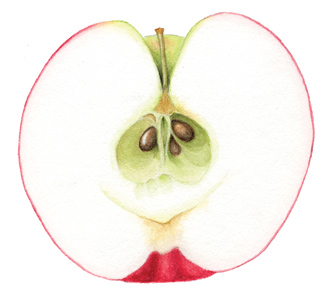 Illustration by Candace HutchinsonMountain report, late February
Trails of quail and fox etch the snow as they go dutifully about their daily drill.
Another seedpod to carry around with you
From Kahlil Gibran: “A seed hidden in the heart of an apple is an orchard invisible.”
Natural events, late March
With the coming of the vernal equinox comes the beginning of spring. It’s comforting to know that lovely Lady Spring has officially stepped on stage, yet we also know that Old Man Winter can return with little warning. New Englanders may recall a big snowstorm on Mother’s Day back in the late 1970s. We rarely see apple blossoms or lilacs until Memorial Day. Yet last year at this time we had seen robins in these parts since mid-February and the ice went out of the harbor on February 28. So the line between winter and spring is not as clear as we would like to pretend. While the crocuses bloom and the buds swell down here in town, there are still patches of snow and ice in the dark woods on the high north slopes of Awanadjo—Blue Hill, “small misty mountain” in the Algonkian language.
Rank opinion
We do not live in a purely black or white, emphatically yes or no, strictly binary cosmos. We live in a universe of nuance and subtlety. We live in the between and the becoming. The world asks us some difficult questions, and to insist that there are only two answers—yes or no, true or false, right or wrong—may hinder or even endanger our survival. There is a vast rainbow of brilliant colors between black and white that may remain unseen and unappreciated by the stubborn and impatient. So often the truth lies in between. The wise will take time to consider and consult before coming to hasty conclusions.
Yet we see this stubborn black/white binary mindset in too many places. It’s probably okay to love one ball team and hate the other, because it’s just a game. But to love everything your political party does and hate everything the other does: this is not OK, because that is not a game. Peoples’ lives and jobs, health and well-being are at stake here. The survival of our nation is at stake here.
Next time a thunder shower rolls over Washington, let’s ask that Congress and the Supreme Court, with their six-figure salaries and Cadillac health plans, take a short recess to go outside and see the rainbow, full of all colors and bending down to touch the living earth with both ends of its brilliant arc. We all have to work with differing opinions and still get the job done. We expect no less from our elected leaders.
And some final seedpods to carry around with you
From Aldous Huxley: “At least two-thirds of our miseries spring from human stupidity, human malice, and those great motivators of malice and stupidity: idealism, dogmatism, and proselytizing zeal on behalf of religious or political ideals.”
From Indira Gandhi: “There are two kinds of people: those who do the work and those who take the credit. Try to be in the first group; there is less competition there.”
And from a warning label on a chainsaw: “Do not attempt to stop the blade with your hand.”
From the mailbag
“Dear Rob: In response to Almanack citing an ‘old saying’ as ‘Half your wood and half your hay, you should have on Candlemas Day’: To be strictly accurate, I suspect the old saying should acknowledge wood, hay, meat, oats, sauerkraut, and preserves, all of which one should have half of on Candlemas Day. Yr most obd’t s’v’t, Robert S., Blue Hill”
Thanks for your letter, Bob. Probably good to have at least half of your wits, your determination, your sanity, your faith, hope, and charity, and both of your wool socks, too.
“From Jeffrey, your fan from Wisconsin: I like your thoughts on time and slowing down. I learned myself, the hard way. On November 2 of last year I hit a deer, totaled my car, the insurance just paid off what I owed… Since then… walking daily, which has been good… slowing down… little by little….”
That’s the almanack for this time. But don’t take it from us—we’re no experts. Go out and see for yourself.
Illustration by Candace HutchinsonMountain report, late February
Trails of quail and fox etch the snow as they go dutifully about their daily drill.
Another seedpod to carry around with you
From Kahlil Gibran: “A seed hidden in the heart of an apple is an orchard invisible.”
Natural events, late March
With the coming of the vernal equinox comes the beginning of spring. It’s comforting to know that lovely Lady Spring has officially stepped on stage, yet we also know that Old Man Winter can return with little warning. New Englanders may recall a big snowstorm on Mother’s Day back in the late 1970s. We rarely see apple blossoms or lilacs until Memorial Day. Yet last year at this time we had seen robins in these parts since mid-February and the ice went out of the harbor on February 28. So the line between winter and spring is not as clear as we would like to pretend. While the crocuses bloom and the buds swell down here in town, there are still patches of snow and ice in the dark woods on the high north slopes of Awanadjo—Blue Hill, “small misty mountain” in the Algonkian language.
Rank opinion
We do not live in a purely black or white, emphatically yes or no, strictly binary cosmos. We live in a universe of nuance and subtlety. We live in the between and the becoming. The world asks us some difficult questions, and to insist that there are only two answers—yes or no, true or false, right or wrong—may hinder or even endanger our survival. There is a vast rainbow of brilliant colors between black and white that may remain unseen and unappreciated by the stubborn and impatient. So often the truth lies in between. The wise will take time to consider and consult before coming to hasty conclusions.
Yet we see this stubborn black/white binary mindset in too many places. It’s probably okay to love one ball team and hate the other, because it’s just a game. But to love everything your political party does and hate everything the other does: this is not OK, because that is not a game. Peoples’ lives and jobs, health and well-being are at stake here. The survival of our nation is at stake here.
Next time a thunder shower rolls over Washington, let’s ask that Congress and the Supreme Court, with their six-figure salaries and Cadillac health plans, take a short recess to go outside and see the rainbow, full of all colors and bending down to touch the living earth with both ends of its brilliant arc. We all have to work with differing opinions and still get the job done. We expect no less from our elected leaders.
And some final seedpods to carry around with you
From Aldous Huxley: “At least two-thirds of our miseries spring from human stupidity, human malice, and those great motivators of malice and stupidity: idealism, dogmatism, and proselytizing zeal on behalf of religious or political ideals.”
From Indira Gandhi: “There are two kinds of people: those who do the work and those who take the credit. Try to be in the first group; there is less competition there.”
And from a warning label on a chainsaw: “Do not attempt to stop the blade with your hand.”
From the mailbag
“Dear Rob: In response to Almanack citing an ‘old saying’ as ‘Half your wood and half your hay, you should have on Candlemas Day’: To be strictly accurate, I suspect the old saying should acknowledge wood, hay, meat, oats, sauerkraut, and preserves, all of which one should have half of on Candlemas Day. Yr most obd’t s’v’t, Robert S., Blue Hill”
Thanks for your letter, Bob. Probably good to have at least half of your wits, your determination, your sanity, your faith, hope, and charity, and both of your wool socks, too.
“From Jeffrey, your fan from Wisconsin: I like your thoughts on time and slowing down. I learned myself, the hard way. On November 2 of last year I hit a deer, totaled my car, the insurance just paid off what I owed… Since then… walking daily, which has been good… slowing down… little by little….”
That’s the almanack for this time. But don’t take it from us—we’re no experts. Go out and see for yourself.

Rob McCall is a journalist, naturalist, fiddler, and long-time pastor of the First Congregational Church of Blue Hill, Maine, UCC. Readers can contact him directly via e-mail: awanadjoalmanack@gmail.com or post a comment using the form below.
When yellow leaves, or none, or few, do hang
Upon those boughs which shake against the cold,
Bare ruined choirs, where late
the sweet birds sang.
— William Shakespeare
Dear Friends: One of the things I love about winter is having time to think. We have two rope-seated, spindle-legged, straight-back chairs—one red, one blue—on either side of the 1905 Glenwood stove in the kitchen. There’s nothing like an hour, or even two, spent there. You know how they say the older you get the faster time goes? Maybe age has nothing to do with it. Time is a function of motion: if there were no motion there would be no time.
 Illustration by Candace Hutchinson
Illustration by Candace HutchinsonEven if we’ve had a mild winter and a nice January thaw, it’s not hard to imagine the feeling of desperation, back in the old days, if you had less than half your wood or hay at the onset of February.
February 2 is Candlemas Day on the church calendar, also known as Midwinter Day or Groundhog Day. The old saying was: “Half your wood and half your hay you should have on Candlemas Day.” Even if we’ve had a mild winter and a nice January thaw, it’s not hard to imagine the feeling of desperation, back in the old days, if you had less than half your wood or hay at the onset of February. And midwinter desperation takes its toll even today. Just look at the obituaries. Some people are too weary in body and others are too weary in spirit to go on. Just look in the woods, where the weak and the hungry are taken by the predators that stalk through the snow. Desperation and death are close cousins and often visit together this time of year. This is the way of midwinter, and it has always been so. But we are not helpless in the face of such desperation. If we have more than half our wood, we can deliver some to warm the cold. If we have extra food or cash, we can donate to the food pantry or the local fuel fund. This will help some weary body. And if we have more than half of our hope and half our faith left, these can really do good for some weary soul. They say wood warms us twice; once when we cut it and once when we burn it. But a friendly visit warms us three times: once when we think of it, once when we do it, and once again when we remember it. Even the poorest person can deliver a load of help, hope, or humor to some soul who desperately needs it to get through the winter. This time of year a good laugh is worth almost as much as a good meal, but how about a good laugh and a good meal? Now, that is ten times better. Get out there and visit. It could make the difference between life and death for a weary soul—maybe even you—in the bleak midwinter. Illustration by Candace Hutchinson
Illustration by Candace Hutchinson Illustration by Candace Hutchinson
Illustration by Candace HutchinsonYr. mst. hmble & obd’nt servant,
Rob McCall

Rob McCall is a journalist, naturalist, fiddler, and long-time pastor of the First Congregational Church of Blue Hill, Maine, UCC. Readers can contact him directly via e-mail: awanadjoalmanack@gmail.com or post a comment using the form below.
Related Articles
Share this article:
2023 Maine Boat & Home Show

Join Us for the Maine Boat & Home Show!
Art, Artisans, Food, Fun & Boats, Boats, Boats
August 11 - 13, 2023 | On the waterfront, Rockland, Maine
Click here to pre-order your tickets.
Show is produced by Maine Boats, Homes & Harbors magazine.







